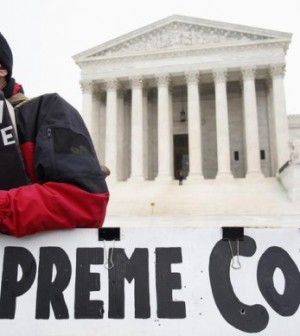By Lawrence Hurley
WASHINGTON, June 26 (Reuters) – The U.S. Supreme Court on Thursday struck down a Massachusetts law that mandates a protective buffer zone around abortion clinics to allow patients unimpeded access.
On a 9-0 vote, the court said the 2007 law violated the freedom of speech rights of anti-abortion protesters under the First Amendment of the U.S. Constitution by preventing them from standing on the sidewalk and speaking to people entering the clinics.
The relatively narrow decision allows the state a chance to enact a new, less-restrictive statute. The court opted against overturning a 2000 precedent, Hill v. Colorado, which upheld a similar buffer-zone law in Colorado.
The 2007 law, which amended an existing statute, restricted conduct outside abortion clinics by introducing a 35-foot (11-meter) no-entry zone that allowed only patients, staff, passersby and emergency services to enter.
In the majority opinion, Chief Justice John Roberts said the act was unconstitutional because it was not narrowly tailored in a way that took into account the free speech rights of protesters, including their ability to hand out leaflets.
The state has “too readily foregone options that could serve its interests just as well, without substantially burdening the kind of speech in which petitioners wish to engage,” Roberts wrote. Although unanimous on the outcome, some of the justices differed on their legal reasoning.
The case pitted the free speech rights of anti-abortion protesters against public safety concerns raised by women’s healthcare providers.
Anti-abortion protesters challenged the law, saying it violated their freedom of speech rights by preventing them from standing on the sidewalk and speaking to those entering clinics. The protesters say their main aim is to counsel women to try to deter them from having abortions.
In a January 2013 ruling, the 1st U.S. Circuit Court of Appeals in Boston upheld the Massachusetts law, prompting the challengers to seek Supreme Court review.
Abortion remains a divisive issue in America. The Supreme Court in its landmark 1973 Roe v. Wade ruling legalized abortion. In recent years, some Republican-governed states have sought to impose new restrictions on abortion.
The case decided on Thursday specifically concerned people who want to protest outside three Planned Parenthood facilities that offer abortions in addition to other health services for women in Boston, Springfield and Worcester.
The Massachusetts law was enacted in part because of safety concerns highlighted by violent acts committed against abortion providers in the past. In 1994, two abortion clinic workers were killed outside a clinic in Brookline, Massachusetts.
During the oral argument of the case before the court in January, a majority of justices had expressed concern that the law may be too broad. One justice, Elena Kagan, posed questions indicating she felt the size of the no-entry zone for protesters around clinics was simply too big.
The case is McCullen v. Coakley, U.S. Supreme Court, No. 12-1168. (Reporting by Lawrence Hurley; Editing by Howard Goller and Grant McCool)







